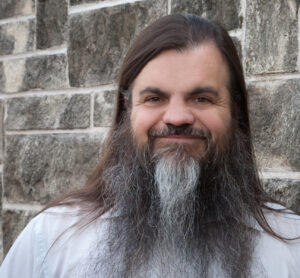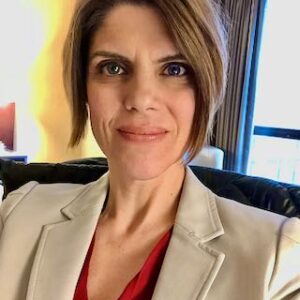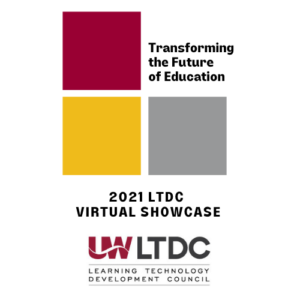About
June 15 and 16, 2021
(10 am to 4 pm CST)
The Showcase includes panels, presentations, and TechTalk virtual sessions in polysynchronous format (i.e., some presentations are pre-recorded while others are “live”).
Transforming the Future of Education
In 2020, the COVID pandemic forced instructors to quickly consider virtual classes and campus classrooms suddenly went dark, prompting so many instructors, students and staff to question the effectiveness of “online” education. Regardless of one’s role on campus, summer 2020 became one of learning, planning and executing. Fall 2020 became one of experimenting, reflecting, and recalibrating. Spring 2021 became one of reorganizing, rethinking and reengineering. Fall 2021 will be one of restarting, retooling and reconstructing.
Before the pandemic, many campuses questioned, “Should we invest in online teaching and learning?” The question is now, “How do we continue to utilize and invest in online teaching and learning to enhance student offerings on our campus?” As we return to more “in person” teaching, how do the lessons learned, the technologies utilized, the experiments tried and the reflections made help shape future educational opportunities? Join us in talking about how the future of education is transforming.
Join keynote speakers Bryan Alexander, author of Academia Next: The Futures of Higher Education, and Kathe Pelletier, Director of Teaching and Learning with EDUCAUSE, as well as instructors and staff throughout UW-System in highlighting ideas and innovations relating to how the lessons learned, the technologies utilized, the experiments tried and the reflections made over the past year can shape future educational opportunities.
Tuesday Keynote
Bryan Alexander
Tuesday, June 15, 2021 10:00-11:00 a.m. (CST)

Education and Technology After the Pandemic
How will colleges and universities change after the COVID-19 disaster? We begin this session by examining the major drivers of academic change which were in play before 2020, including emerging technologies, the open revolutions, demographic transitions, changing enrollment, and economic developments. Next we look back at the extraordinary year and a half we just experienced, identifying key aspects which impacted, and will continue to shape, academia. Then we address two huge trends: climate change and automation. Finally we synthesize these stories to point towards the next decade of higher education.
Biography:
Bryan Alexander is an award–winning, internationally known futurist, researcher, writer, speaker, consultant, and teacher, working in the field of higher education’s future.
Bryan speaks widely and publishes frequently. He recently published Academia Next: The Futures of Higher Education for Johns Hopkins University Press (January 2020), which won an Association of Professional Futurists award. He is currently working on Universities on Fire: Higher Education in the Age of Climate Crisis (2022). His two other recent books are Gearing Up For Learning Beyond K-12 and The New Digital Storytelling (second edition).
Bryan is currently a senior scholar at Georgetown University and teaches graduate seminars in their Learning, Design, and Technology program. To learn more about Bryan’s accomplishments, please visit his website.
Tuesday Schedule
Wednesday Keynote
Kathe Pelletier
Wednesday, June 16, 2021 2:15-3:15 p.m. (CST)

Perspective-Taking and Paradoxes
It might be surprising to hear the words, “the pandemic has been a gift,” especially in light of the lives lost and the disruption of relative normalcy. The last year has felt alternately long and isolating, and frantic and connecting.
Digital transformation is upon us in higher education. We might be tempted to maintain the momentum we felt as we rapidly transitioned to remote teaching last spring and take action to redefine our institutions to create an innovative future. It’s also tempting to imagine ways we can restore our campuses to the way we were before the pandemic. Or maybe we are focused on just adapting to the new normal.
Technologies, new and old, have offered us tools to engage with students and each other. Technology has offered us a bridge through the pandemic. But as institutions adapt to students’ needs, as staff support course development and delivery, and as faculty bring passion in their areas of expertise, we can recognize the opportunity in the continued collaboration and in listening.
It’s time to take a collective breath, and just pause for a moment. This is the time when we can practice perspective-taking, learning from others’ experiences as much as our own. Pausing to recognize the tension that might exist between technology, teaching, and a students-first approach. Let’s reflect on what we’ve learned from this past year – let it really settle in – and then we can collectively lean in to creating the future together.
Biography:
With more than 20 years of experience in higher education with positions in areas such as academic advising, online learning, instructional design and competency-based education, Dr. Kathe Pelletier currently holds the role of Director, Teaching and Learning Program with EDUCAUSE. She brings an expertise for combining traditional higher education best practice with innovative delivery models. She has been recognized by the International Center for Supplemental Instruction for starting and scaling the first online Supplemental Instruction programs and by the Online Learning Consortium for a hybrid framework that creates a structure for creativity yet insures consistency and quality in hybrid program and course delivery. Through her career, Kathe has accomplished such things as building an online student success center from scratch, establishing a competency-based curriculum model that became an anchor for a self-paced CBE program, developing and launching a holistic assessment and outreach system that delivered personalized resource recommendations to incoming students, and optimizing a faculty community of practice that was not only engaging and satisfying to the faculty participants but also increased student learning outcomes and success metrics.
Wednesday Schedule
Central Time |
Student Experience & Success Track (SS) | Online Pedagogy Track (OP) | Leveraging Technology Track A (LTA) | Leveraging Technology Track B (LTB) |
|---|---|---|---|---|
| 10:00 – 10:30 am | Developing and Sustaining a Community of Online Learners (SS4)
Mary Churchill |
Perusall: Social Reading Helps Students Engage with Course Content and Each Other (LTB3)
Brian Teague & |
Crash Course in Engagement with a Hybrid Classroom Model (LTA4)
Kirsten Mortimer |
Find Course Resources Through the Library: Faculty Select (LTB4)
Stephanie Warden |
| 10:30 – 10:45 am | Break – Restore – Explore | |||
| 10:45- 11:15 am | Student Voices: Strengths & Weaknesses of Online Course Content and Delivery as Identified by Adult Students (SS5)
Kathleen Brock & Greg Matthias |
Grading Sophomore Compositions: The Painfully Real Struggle to Connect and Redirect Weary Students with Constructive Online Criticism (OP5)
Lynn Ludwig |
From Free-form to Modules: How Additional Structure Supports Student Well Being and the Tools That Can Make it Happen (LTA5)
Kyle Horne |
HyFlex Options for the Redevelopment of a Course in Psychological Measurement and Evaluation (LTB5)
Travis Tubre |
| 11:15 – 11:30 am | Break – Restore – Explore | |||
| 11:30 am – 12:00 pm | Lessons Learned: Supporting Students Online Learning and Addressing Equity (SS6)
Breeyawn Lybbert |
Course Flow and Completeness: Counteracting Canvas Circumventions (OP6)
Pippin Michelli |
Using Digital Technology to Redesign & Improve an In-Person Simulation for an Online Class (LTA6)
Davida Alperin |
Use of Online Discussion Boards for Community Building and Student Engagement (LTB6)
Holly Attenborough |
| 12:00 – 12:15 pm | Break – Restore – Explore | |||
| Session | ||||
| 12:15 – 1:00 pm | Panel 3: Open Educational Resources (OER) (P3)
Moderator: Bob Butterfield (STO) |
|||
| 1:00 – 1:15 pm | Break – Restore – Explore | |||
| 1:15 – 2:00 pm | Panel 4: The UW System Student Experience (P4)
Moderator: Heidi Catlin, UW-Stout |
|||
| 2:00 – 2:15 pm | Break – Restore – Explore | |||
| 2:15 – 3:15 pm | Keynote
Perspective-Taking and Paradoxes (KN) |
|||
| 3:15 – 4:00 pm | Social Hour | |||

